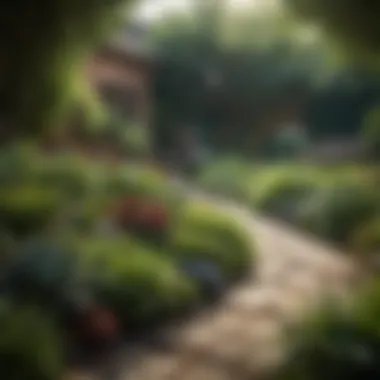Natural Ways to Keep Mosquitoes Away: Expert Tips


Intro
Mosquitoes are more than just a nuisance; they can pose serious health risks by transmitting diseases. Many people turn to chemical repellents for relief, but these products often carry side effects and environmental concerns. This article aims to shed light on natural methods to deter mosquitoes effectively. We will explore various strategies including essential oils, natural repellents, and landscaping ideas. Additionally, lifestyle changes that can impact mosquito populations will be examined.
Understanding these natural approaches provides valuable alternatives for homeowners, gardeners, and anyone looking to enjoy outdoor spaces without the constant annoyance of mosquitoes. Embracing eco-friendly solutions not only enhances personal comfort but also contributes to healthier ecosystems. Let’s delve into these natural methods to gain insights into prevention and treatment strategies.
Understanding Mosquito Behavior
Gaining insight into mosquito behavior is critical for effective natural deterrence strategies. Knowing how mosquitoes operate offers valuable advantages. It helps homeowners understand when and why mosquitoes are active. This knowledge can influence the implementation of preventative measures before they become a nuisance. Moreover, being aware of their behavior enhances the effectiveness of repellent strategies. After all, much can be managed by aligning our actions with the behavior of these pests.
Life Cycle of Mosquitoes
The life cycle of mosquitoes comprises four distinct stages: egg, larva, pupa, and adult. Each stage plays an important role in the propagation of mosquito populations. Eggs are usually laid in or near water. After about two days, they hatch into larvae. These larvae live in water and develop for about one to two weeks. Following the larval stage, they transition into pupae. This stage lasts for another few days as they begin to metamorphose into adults. Eventually, adult mosquitoes emerge, ready to seek blood meals for reproduction.
Understanding the life cycle can aid in convincing homeowners to eliminate standing water on properties. Simple practices like regularly checking birdbaths, clogged gutters, and plant pots can drastically reduce mosquito breeding areas.
Feeding Habits and Preferences
Mosquitoes are known for their blood-feeding habits, which primarily serve as a requirement for egg development. Female mosquitoes are the ones that bite humans and animals. They have specific preferences for different hosts based on factors like carbon dioxide emission, body temperature, and sweat. Interestingly, some studies suggest that certain blood types may attract mosquitoes more effectively.
The preference for blood meals varies between species. For example, Aedes mosquitoes are often drawn to humans, while Culex may favor birds. Understanding these habits allows homeowners to modify their environments. If they are aware of the types of mosquitoes in their area, they can take measures to deter them more effectively.
Attractants and Distractors
Certain factors attract mosquitoes, which includes body heat, sweat, and specific scents. This is crucial in understanding how to manage their presence. For example, perfumes or lotions with floral notes can lure mosquitoes. On the flip side, using unscented or lemon-scented products may help in misunderstanding their attraction.
Natural distractors can include plants that produce strong aromas. For example, citronella and lavender are commonly known plants that can dissuade mosquitoes. Homeowners can strategically place these around patios or gardens to cultivate a mosquito-repelling ambiance. Incorporating plants into natural landscaping not only looks appealing but adeptly manages insect populations in outdoor settings.
Ultimately, understanding mosquito behavior provides an advantage. It informs targeted approaches that can effectively reduce their populations and minimize the discomfort they cause.
Essential Oils as Natural Repellents
Essential oils have become a vital part of the conversation on natural mosquito repellents. Their appeal lies in their ability to deter these pests while also providing pleasant aromas. Not only do they serve as a means to keep mosquitoes at bay, but they also enhance the environment in which they are used. Many essential oils possess insect-repelling properties that make them suitable for both personal use and home applications. Therefore, utilizing essential oils emerges as an effective strategy within a broader pest control plan without exposing individuals to harmful chemicals.
Top Essential Oils for Mosquito Control
Citronella
Citronella essential oil stands out due to its proven efficacy in repelling mosquitoes. It originates from the leaves and stems of a type of lemongrass. One of its key characteristics is its strong citrus scent that humans often find pleasing. This natural oil is popular because it creates an environment unattractive to mosquitoes. The unique feature of citronella lies in its dual action as both a repellent and a deodorizer. However, it is important to note that while it can be effective, its aroma tends to dissipate quickly, calling for frequent reapplication.
Eucalyptus
Eucalyptus oil is another powerful mosquito repellent. It is extracted from the leaves of the eucalyptus tree. The key characteristic of eucalyptus oil is its ability to mask human scents, making it harder for mosquitoes to locate their hosts. This oil is recognized for its efficacy in reducing mosquito landings. One unique aspect of eucalyptus oil is its potential for long-lasting protection when used correctly. However, it may cause skin irritation in some individuals, necessitating caution in its use.
Peppermint
Peppermint oil, derived from the peppermint plant, adds another layer to natural mosquito control. It has a refreshing fragrance that is often favored by many. A significant aspect of peppermint oil is its strong aroma, which can repel mosquitoes effectively. Additionally, it contains compounds that can provide relief from their bites. However, users should be aware that its potency can cause irritation when applied directly to the skin, so proper diluting with carrier oils is advisable.
Lavender
Lavender oil is well known for its calming properties, but it also serves a practical purpose in mosquito control. This oil's sweet floral scent acts as a deterrent, discouraging mosquitoes from approaching. The primary characteristic that makes lavender oil beneficial in this context is its soothing effect on the skin, which can help relieve irritation caused by mosquito bites. Its unique feature is that it can be used in various applications, such as diffusers or homemade sprays. Nevertheless, while its repellent effects are notable, they tend to be of shorter duration compared to some other oils mentioned above.
Application Methods
Diffusers
Diffusers are an effective way to disperse essential oils in the air. Using diffusers offers a consistent method to utilize these oils throughout a space. The key characteristic of diffusers lies in their ability to fill an area with fragrance, creating an environment less inviting to mosquitoes. They come in various forms, from electric devices to reed diffusers. However, a drawback is that their effectiveness may decrease in large, open spaces.
Mixing with carrier oils


Mixing essential oils with carrier oils has become a preferred method for many. Carrier oils, such as coconut or jojoba oil, dilute essential oils, making them safe for skin application. This method retains the effectiveness of the essential oil while reducing potential irritation. It is a beneficial choice because it allows personalized mixtures tailored to individual preferences. The main advantage is that it makes the application straightforward and safer for the skin, although formulation ratios require proper knowledge for optimal results.
Spray formulations
Spray formulations enable easy application, especially for outdoor activities. Using essential oils in a spray is an advantageous method for broader coverage. A key feature of sprays is convenience; they can be applied quickly and are great for targeting exposed skin or clothing. However, the disadvantages include the need for regular reapplication, as the effects can diminish over time due to environmental conditions.
Effectiveness and Duration
The effectiveness and duration of essential oils as mosquito repellents can vary. Factors like the specific oil used, the concentration, and environmental conditions play significant roles. Generally, natural oils exhibit repellent properties that can last from a few hours to several. It is crucial to measure individual experiences and adjust frequency of application according to specific needs.
In summary, essential oils represent a remarkable natural alternative to chemical repellents. Each oil varies in its effectiveness, scent, and safety considerations, making it essential to choose the right option based on personal preference and sensitivity.
Natural Repellents and Deterrents
Natural repellents are essential for improving our quality of life in outdoor settings. Mosquitoes are not only a nuisance but also vectors of diseases. Therefore, understanding how to deter them without harmful chemicals is crucial. This section addresses the various natural methods available, focusing on homemade recipes and commercial options.
Natural repellents often rely on ingredients that can be found in households or easily sourced in local shops. Utilizing these alternatives reduces environmental impact while promoting personal health. Here we explore several effective options.
Homemade Repellent Recipes
Vinegar and water solution
Vinegar mixed with water creates a simple yet effective mosquito repellent. The acetic acid in vinegar acts to repel mosquitoes through its strong odor. This nature makes it a preferred choice for individuals opting for natural solutions.
The typical ratio is one part vinegar to one part water, allowing for easy application. While it may not provide as long-lasting protection compared to synthetic options, its rapid availability and affordability make it a practical choice. However, some individuals might find the aroma of vinegar off-putting.
Herbal solutions
Herbal solutions utilize plants known for their mosquito-repelling properties. Examples include basil, mint, and lemongrass. The active compounds in these herbs act as natural deterrents against mosquitoes. Many appreciate herbal solutions because they are also safe for personal use around pets and children.
A notable feature is that these can be made fresh, using homegrown herbs, which gives an element of sustainability. Nevertheless, their effectiveness can vary based on the concentrate of the herbs used and environmental factors.
Garlic spray
Garlic spray is another DIY repellent that has gained popularity. Garlic contains compounds that produce a strong scent, effectively masking human odors that attract mosquitoes. The preparation typically involves mixing crushed garlic with water and allowing it to steep. This versatility allows homeowners to apply garlic spray around gardens and entryways.
Despite its insect-repelling qualities, garlic spray may require frequent reapplication, especially after rain. Some individuals may also dislike the lingering smell around their homes. However, many still view it as an effective natural alternative to chemical-based repellents.
Commercial Natural Repellents
Commercial natural repellents are products formulated with plant-based ingredients. They enable convenient application without the need for preparation at home. Many consumers appreciate brands that highlight the use of essential oils such as citronella, eucalyptus, and peppermint.
These products come in various forms, including sprays, lotions, and even candles. When using commercial products, it is important to check labels for active ingredients and ensure they meet personal safety standards. Products with natural ingredients appeal to environmentally conscious consumers, providing peace of mind against toxic alternatives.
In summary, both homemade and commercial natural repellents offer varying degrees of effectiveness against mosquitoes. Exploring different options helps individuals find solutions that fit their lifestyle and environmental values. As awareness of the importance of mosquito control grows, so will the variety of natural options available to deter these pests.
Landscaping Strategies to Minimize Mosquito Presence
Effective landscaping plays a critical role in reducing mosquito presence in residential areas. By incorporating specific plant species and strategic arrangements in your garden, you can create an inhospitable environment for mosquitoes while enhancing the overall aesthetic appeal of your outdoor space. Such methods are not just practical but also provide an eco-friendly alternative to chemical repellents. Well-planned landscapes can serve multiple functions: they can beautify living spaces, attract beneficial insects, and fundamentally disrupt mosquito breeding behaviors.
It is essential to realize that the choices in landscaping must consider the local environment and your particular preferences. Selecting appropriate plants can significantly deter mosquitoes, while careful water management ensures that standing water, a breeding ground, is minimized. In essence, effective landscaping techniques not only target mosquitoes but contribute to a healthier ecosystem.
Choosing Mosquito-Repelling Plants
Selecting mosquito-repelling plants is an effective strategy for naturally keeping these pests at bay. Here are some popular options to consider:
Marigolds
Marigolds are often chosen for their vibrant color and ease of growth. What sets Marigolds apart is their ability to exude a fragrance that mosquitoes find repulsive. The key characteristic of Marigolds is their pungent scent which can mask odors that attract these pests. Many people appreciate Marigolds because they are hardy and provide a pop of color in various climates.


A unique feature of Marigolds is their ability to thrive in poor soil conditions, thus making them a low-maintenance option. However, while they are effective as a deterrent, their impact may be limited to smaller, localized areas. Regular maintenance is necessary to ensure they remain healthy and continue to provide protection against mosquitoes.
Basil
Basil is another excellent choice for mosquito control. The essential oils found in Basil possess properties that repel mosquitoes effectively. This herb is often favored for its culinary uses, allowing homeowners to enjoy its practical benefits in cooking while also deterring insects.
The distinctive aroma of Basil is pleasing to humans but uninviting to mosquitoes. Its unique feature lies in its versatility—Basil can be grown in pots or directly in the garden, adapting well to different spaces. One downside is that Basil may require more attention than some other plants, as it prefers specific growing conditions, and the leaves can quickly become damaged by pests if not well cared for.
Rosemary
Rosemary is renowned for its aromatic qualities and culinary uses, which help it double as a mosquito repellent. Its woody scent can help mask odors that attract mosquitoes. The most appealing aspect of Rosemary is its drought resistance; it requires less water once established, making it a sustainable choice.
A unique feature of Rosemary is its dense foliage, which can be effective in creating barriers. While this helps deter mosquitoes, Rosemary may not be as effective in smaller gardens without adequate sunlight and space. Frequent pruning might be necessary to keep the plant healthy and productive.
Creating Barriers with Vegetation
Creating physical barriers using vegetation can provide a more effective approach to controlling mosquito populations. Dense bushes and shrubs can serve as natural barriers, preventing mosquitoes from entering your living space. Additionally, employing thorny plants can deter not just mosquitoes but other pests as well. When planning the layout of your garden, think about incorporating several layers of vegetation, which can offer enhanced protection.
Water Management Techniques
Managing water is crucial in reducing mosquito habitats. Water management strategies can significantly reduce the allure for mosquitoes to breed in your area. Here are two critical approaches:
Eliminating Standing Water
Eliminating standing water is a fundamental strategy in mosquito control. Stagnant water accumulations serve as breeding grounds, making removal essential. The primary advantage of this practice is its simplicity; it can be as easy as regularly checking any containers in your yard that might collect rainwater, such as bird baths and flowerpot saucers.
Taking this step minimizes opportunities for mosquitoes to reproduce, which contributes to fewer mosquitoes in your environment. However, it does require consistent efforts and observation, as new sources of standing water can emerge quickly.
Installing Drainage Systems
Installing drainage systems can help manage excess water efficiently. These systems work to direct water away from areas that are prone to pooling, thus making properties less hospitable to mosquitoes. This method is beneficial for properties that often experience flooding or heavy rainfall.
The unique feature of drainage systems is their ability to transform areas prone to standing water into dry, usable space. However, establishing a proper drainage system can be costly and may require professional help. Yet, the long-term benefits in mosquito control often outweigh the initial investment.
Personal Lifestyle Changes and Precautions
Mosquito control is not solely about using repellents or sprays. Personal lifestyle changes and precautions can significantly reduce the likelihood of mosquito encounters. This section delves into specific strategies that individuals can adopt. The benefits go beyond just personal comfort; these methods contribute to a broader effort to minimize mosquito populations in various environments. By making informed choices, people can enjoy outdoor spaces more freely and safely.
Avoiding Peak Mosquito Hours
Timing is crucial when it comes to mosquito exposure. Mosquitoes are generally most active during dawn and dusk. By avoiding outdoor activities during these peak hours, individuals can significantly decrease their chances of being bitten. Keeping track of local weather forecasts and knowing when these hours occur can be useful. This simple change in behavior does not require extra resources or efforts. Instead, it’s about managing time effectively to ensure comfort in outdoor settings.
Choosing Appropriate Clothing
Choosing the right clothing is a powerful way to protect against mosquitoes. The attire we select can create a barrier between our skin and these pests.
Light-colored fabrics
Light-colored fabrics are known to be less attractive to mosquitoes when compared to dark ones. Mosquitoes tend to be drawn to dark colors as they can absorb more heat. Hence, wearing light colors can blend with the environment, making a person less noticeable. This beneficial choice can help individuals stay more comfortable while outdoors. However, wearing light colors may not completely prevent bites; caution is still necessary.
Long sleeves and pants
Wearing long sleeves and pants adds another layer of protection against mosquito bites. This attire can cover more skin, reducing the areas exposed to bites. Long garments serve as a physical barrier, particularly in areas prone to high mosquito activity. The trade-off includes potential discomfort in warm weather. However, light and breathable fabrics can mitigate this issue, providing comfort while enhancing protection.
Understanding Personal Attractants
Understanding what makes a person more attractive to mosquitoes can aid in effective deterrence. Various factors contribute to this increased attraction.
Body chemistry


Body chemistry plays a significant role in how attractive a person is to mosquitoes. Factors such as natural body odor, skin temperature, and even blood type influence how mosquitoes perceive individuals. For example, some people may exude certain scents that attract mosquitoes, while others may repel them. Awareness of body chemistry can lead individuals to adjust their habits for better protection by altering diet or hygiene practices, making it a strategic choice.
Use of fragrances
Fragrances in lotions, perfumes, and soaps can either repel or attract mosquitoes. Strong floral or fruity scents may draw mosquitoes closer, while earthy or herbal scents might deter them. Selecting personal fragrances wisely can help minimize unintended attraction. This choice highlights the importance of understanding how even daily routines can play a role in mosquito interactions. Individuals should evaluate their products to find those that do not attract these pests, ultimately contributing to a more effective personal mosquito control strategy.
Monitoring these aspects of everyday life can prevent discomfort and promote a more enjoyable outdoor experience.
Monitoring and Controlling Existing Population
Monitoring mosquito populations is a crucial step in managing any infestation. Understanding where these insects breed and thrive enables property owners to implement targeted measures for control. This proactive strategy also minimizes reliance on chemical pesticides, promoting a more eco-friendly approach to mosquito management.
Identifying Breeding Sites
One of the first steps in monitoring mosquito populations is identifying potential breeding sites. Mosquitoes lay their eggs in standing water, which can be found in various places around a home. Common areas include:
- Birdbaths: Regularly empty and scrub to remove eggs.
- Flower pots: Ensure proper drainage, as excess water can collect.
- Gutters: Clean gutters regularly to prevent water accumulation.
- Pet water dishes: Change water frequently to disrupt breeding cycles.
- Tires and buckets: Store these items upside down or in a sheltered space.
Observing these common spots can significantly reduce the mosquito population in one's environment. A few minutes each week can lead to effective control, ultimately reducing the likelihood of bites and disease transmission.
Traps and Deterrents for Mosquitoes
Employing traps and natural deterrents is another effective method to monitor and control the existing mosquito population. Various devices and methods can help capture or repel these insects:
- CO2 traps: These attract mosquitoes by simulating human breath. They can capture adult mosquitoes and help monitor their presence in the area.
- Sticky traps: These are best placed around areas with high mosquito activity. They can provide insights into mosquito types and population size.
- Natural repellents: Using citronella candles or diluted essential oils in diffusers can deter mosquitoes from an area. These methods disperse scents that mosquitoes typically avoid.
- Electric mosquito swatters: Manual swatters are effective for immediate control when few mosquitoes are present.
"By regularly monitoring and employing preventive measures, homeowners can effectively manage mosquito populations, tackling infestations swiftly and sustainably."
Understanding and adopting these monitoring and control practices significantly improve the chances of maintaining a mosquito-free environment. It allows homeowners to take charge of their space while contributing to broader ecological health.
Integration of Natural and Chemical Solutions
The integration of natural and chemical solutions in mosquito control provides a balanced approach for homeowners and others looking to reduce mosquito populations effectively. While natural methods are environmentally friendly and often safer for people and pets, there are times when chemical alternatives can significantly enhance control measures. Understanding when and how to use these approaches can make a substantial difference in the effectiveness of mosquito management.
Natural solutions such as essential oils, repellents, and landscaping adjustments often lay the foundation for an eco-friendly approach. However, one must recognize situations where these methods may not achieve the desired outcomes alone. For example, during peak mosquito breeding seasons, when populations are exceedingly high, chemical interventions can provide faster and more reliable relief.
By blending the use of natural and chemical strategies, individuals can customize their mosquito control plan. This integration allows for the benefits of both options: the immediate effectiveness often provided by chemical solutions and the sustained deterrent effects of natural methods. Furthermore, combining these strategies can lead to enhanced overall effectiveness and longer-lasting results.
"Chemical solutions should not completely replace natural strategies. Instead, they should amplify the overall effectiveness of your mosquito control plan."
When to Consider Chemical Alternatives
Chemical alternatives should be considered in scenarios where immediate action is necessary, and the mosquito population has reached a concerning level. Situations such as outdoor events or gatherings can warrant the use of chemical repellents, especially when guests are at risk of bites.
Additionally, certain geographical areas may experience severe mosquito-borne disease outbreaks. In these circumstances, relying solely on natural methods may not suffice to protect you and your loved ones. Chemical solutions, such as insecticides or targeted fogging, can eradicate adult mosquitoes quickly and help mitigate health risks.
It is essential to remain informed about the potential side effects of chemicals; understanding the ingredients and their safety profiles can guide informed decision-making. An effective strategy can be to use natural approaches as a first line of defense and then incorporate chemical alternatives when necessary.
Combination Strategies for Enhanced Effectiveness
Using a combination strategy maximizes both natural and chemical alternatives, creating a powerful defense against mosquitoes. Here are some effective combination methods:
- Pre-emptive Action: Begin with natural deterrents, such as planting mosquito-repelling plants like marigolds or basil. The natural barriers reduce the population before chemical measures become necessary.
- Targeted Use of Chemicals: When using chemical solutions, aim to target specific areas known for heavy mosquito activity, such as stagnant water sources or sheltered areas.
- Layering Approaches: Combine personal repellents, such as essential oil lotions, with chemical sprays around your outdoor space. This layered method offers protection from direct bites and discourages mosquitoes from lingering nearby.
- Time of Application: Utilize natural solutions consistently and apply chemical treatments during peak mosquito hours, typically at dusk and dawn. This timing enhances the effectiveness of both strategies.
Integrating various methods leads to improved safety and efficacy in mosquito control. By being proactive and strategically combining these diverse approaches, one can foster an environment less inviting to mosquitoes.
Culmination
Summary of Key Points
- Understanding mosquito behavior is essential for effective control measures. Recognizing their life cycle and feeding habits helps in strategic planning.
- Essential oils are effective natural repellents, with options like citronella and eucalyptus showing promising results. Application methods vary, including diffusing oils and creating sprays.
- Homemade repellents, such as vinegar solutions and garlic sprays, provide cost-effective and safe alternatives to commercial products.
- Landscaping strategies, like planting mosquito-repellent plants and managing standing water, play a crucial role in prevention.
- Personal lifestyle adjustments can significantly reduce the chances of mosquito bites. These include avoiding peak hours and choosing suitable clothing.
- Monitoring existing populations is vital. Understanding breeding sites and using traps can aid control efforts.
- Integration of natural and chemical solutions is sometimes needed but should be balanced to maintain environmental integrity.
Future Directions in Natural Mosquito Control
The future of mosquito control will likely see a continued emphasis on natural methods. Researchers are exploring innovative, plant-based repellents and larvae control options. This shifts towards sustainable pest management approaches are driven by public demand for safer solutions. Enhanced studies on body chemistry may lead to personalized repellents. Additionally, advancements in technology might improve the efficacy of traps and monitoring systems.
"The path forward lies in blending natural solutions with technology to create integrated pest management strategies."
As natural methods become more refined, integrating community education around these practices will also play a crucial role. Homeowners and outdoor enthusiasts will benefit as they become informed participants in mosquito control, improving living conditions while safeguarding the environment.















